How Albania fell out with the USSR
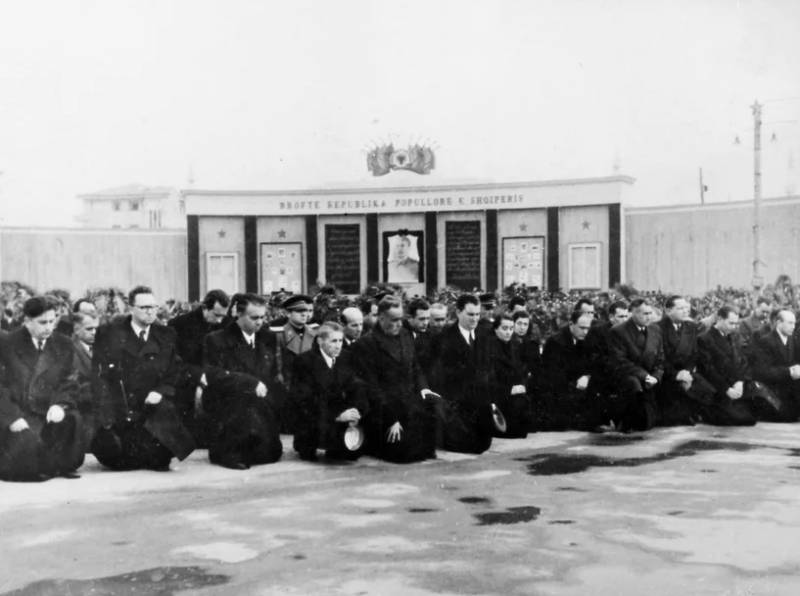
"Stalin's good, immortal deed must be fully defended." Funeral meeting dedicated to the memory of JV Stalin with the participation of the leadership of Albania. Tirana, 9 March 1953
Strategic foothold
The ethnogenesis of the Albanians is not completely clear. Among their ancestors are the ancient Indo-Europeans of the Mediterranean - the Pelasgians, Illyrians and Thracians. The Greeks, Slavs and Italians had a great influence on the formation of the Albanian people. In a later period, Turkish influence was noted.
In the era of Antiquity and the Middle Ages, Albania was part of Macedonia, the Roman and Byzantine empires, then Venetians, Greeks, crusaders, Neapolitans and Serbs alternately dominated there. During the rise of the Ottoman Empire, the Albanians, together with the Serbs, put up very stubborn and long-term resistance to the Turks. Natural conditions, mountainous terrain helped the Albanians to restrain the onslaught of the Ottomans. Only by 1571 most of Albania was conquered by the Turks. The mountainous north retained partial autonomy. Albania was Islamized. At the same time, the country retained a high degree of freedom. Albanians were actively involved in the Ottoman and military elite of the empire, formed irregular troops, which were marked by atrocities against Christians.
The rule of Turkey lasted for several centuries. Only in 1912 in Vlore, when the armies of the Balkan states inflicted a heavy defeat on Turkey, was the independence of Albania proclaimed. And in 1913, the great powers recognized the independence of the Principality of Albania, while its territory was reduced by more than two times from that claimed by the Albanians themselves. Significant communities of Albanians ended up on the territory of Montenegro, Greece and Serbia. In the future, Greece and Italy began to claim the lands of Albania. In 1915, the Entente countries agreed to the partition of Albania. The Entente supported the claims of the Italians to tear Italy away from the German bloc.
Why did the great powers of different eras seek to control Albania? The point is geographic location. Albania is an ideal springboard for influencing the Western Balkans and Italy. The military fleet, based in Albania, controls shipping in the Adriatic Sea, the exit from this sea (Otranto Strait). In the future, minerals were added to this: oil, coal, chromium, copper and nickel, which were of interest to Greece, Italy and Germany.
War for Vlora
The country has long been one of the poorest in Europe. In essence, there is no single people either. Muslims, Orthodox Christians (Arnauts) and Catholics (Arberishis or Italo-Albanians) are, in fact, separate peoples, often weakly connected with their homeland. In Albania itself, the southern Albanians (Muslims and Orthodox) and the northern (Muslims and Catholics) stand out, with strong tribal traditions. These communities had their own interests and found it difficult to compromise on the most important issues, often conflicted.
In the first decades of the 1919th century, Rome tried to "restore" its presence in Albania. Make the country your outpost and springboard for expansion in the western part of the Balkans. During the First World War, the Albanians split over religious and tribal interests. The Muslims demanded a Muslim prince and looked at Turkey as an ally. The Greeks occupied the southern part of the country, the Italians occupied Vlore (Flora). Then most of the country was occupied by Austrian and Bulgarian troops. At the end of the war, the territory of Albania was occupied by Italians, Serbs and Greeks. The Serbs claimed the northern part of the country, the Greeks - the southern (Northern Epirus). At the peace conference in Paris, Italy tried to get a mandate for Albania. In XNUMX, Italy and Greece concluded a new agreement on the future partition of Albania: Greece received Northern Epirus (Southern Albania) in exchange for the recognition of Central Albania as Italian.
Great Britain and France supported the idea of dividing Albania between Italy, Greece and Yugoslavia. However, this agreement was adopted without taking into account the opinion of the Albanian representatives. Albanians, in order to preserve the integrity of the country, agreed to the Italian protectorate and expressed their readiness to provide armed resistance to the decision of the great powers to partition.
In March 1920, US President Woodrow Wilson, pursuing his interests, blocked the Paris Agreement and supported the independence of Albania. In December 1920, the League of Nations recognized the sovereignty of Albania. In the summer of 1920, the Albanians began an uprising against the Italian occupation. It covered Southern Albania and the Vlora region. The rebels were inferior to the Italian army (20 thousand people) in number and in armament. However, the rebellion widened, and the rebels laid siege to Vlora.
Already in August 1920, Italy admitted defeat, promised to withdraw its troops and return Vlore. Italy recognized the independence and sovereignty of Albania within the 1913 borders. At the same time, the Italians retained n over several islands to oversee the bays of Vlore.
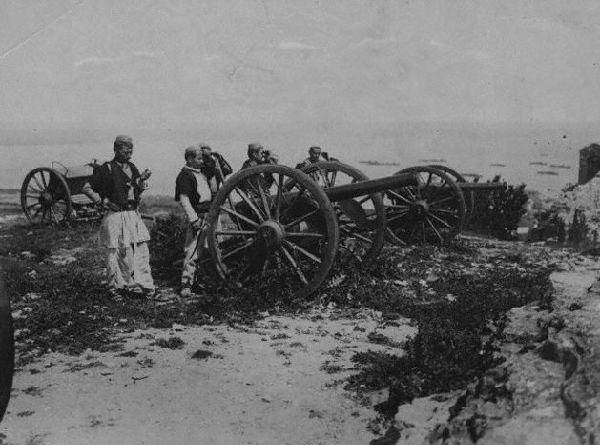
Italian guns captured by the Albanians. 1920 g.
The revolt of Noli and the Zogu dictatorship
In January 1920, the Albanian National Congress re-proclaimed the country's independence and declared Tirana the capital of the state. Yugoslavia, under pressure from the League of Nations, had to withdraw its troops from Albania in 1921.
The restoration of independence did not lead to stability and prosperity. Different communities and tribes could not agree, governments quickly replaced each other. The country was slipping into complete anarchy. Yugoslavia (until 1929 the Kingdom of Serbs, Croats and Slovenes, KSHS) and Italy had their own parties in the country.
The Italians tried to use the turmoil in Albania to restore their power. They relied on the liberal politician and the Orthodox Bishop Fan (Theophan) Noli, who sought to modernize the country. In June 1924, he revolted against a conservative politician, Prime Minister Ahmet Zogu (June Revolution), who was targeting Yugoslavia. The revolutionary government headed by Noli tried to modernize the country using the experience of the USSR.
However, the "red" bishop did not have widespread popular support. Zog fled to Yugoslavia, where he received the support of the KSKhS government and the Russian White Guards. With the help of the Yugoslav authorities and white emigrants, he formed a detachment and already in December 1924 defeated the troops of Noli. The Russian detachment was commanded by Colonel of the Russian and Serbian armies Ilya Miklashevsky (in the White Army he commanded a cavalry regiment, brigade and division). The Noli government fled to Italy.
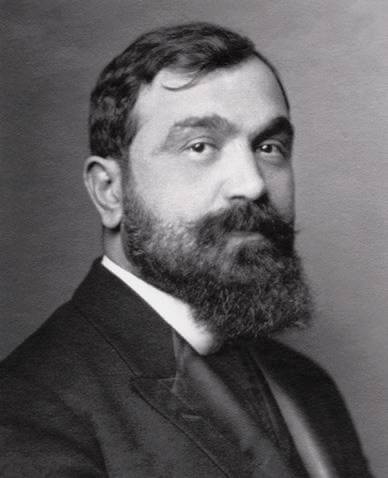
Prime Minister of Albania in 1924 Fan Stylian Noli
The dictatorship of Ahmet Zogu is established in Tirana.
Since January 1925 Zogu has been the President of the Republic. In August 1928 he proclaimed himself the Albanian monarch - Zogu I Skanderbeg III. He defeated the opposition, put an end to mass banditry and tribal anarchy. He began the European modernization of the country, in essence, as planned by Noli. Socio-economic reforms required serious financial investments, so Zogu began to focus on richer Italy (in comparison with the KSKhS). Tirana also feared the geographically significantly close Yugoslavia more than Italy. The Italians were overseas.
This policy was supported by Albanian Catholics. In 1925, the rights to develop minerals were transferred to Italian companies. The National Bank of Albania was brought under Italian control. Rome financed the construction of roads, bridges and other infrastructure. The Italians built most of the schools and sent teachers there. In 1926 and 1927, two Tirana Pacts were signed - a treaty of friendship and security for 5 years and a treaty on a defensive alliance for 20 years. The Italians sent advisers and weapon for the modernization of the Albanian army. Then, under the influence and support of Mussolini, Zogu decided to try on the royal crown in order to pacify the local feudal lords. Rome made new financial investments in the Albanian monarchy.
Albanian crisis
Zogu, having strengthened his position in the country, tried to preserve the independence of Albania and reduce the influence of Italy. During the global economic crisis, which also affected Albania (its agricultural exports), the Mussolini government tried to strengthen its influence. In 1931, Zogu secured a new financial tranche, but refused to renew the 1st Tirana Pact. Tirana also tried to find other patrons in the foreign arena and limit the socio-economic influence of Italy. In particular, in the field of education. Tirana tried to get loans from Yugoslavia, other countries of the Little Entente (Romania and Czechoslovakia), from the United States and France. But everywhere she was refused. Nobody wanted to finance the impoverished Albania, which de facto could not return the invested funds. In addition, the crisis has affected all capitalist countries.
Italy, using the difficulties of Albania, tried to put economic and military pressure on it. Sent a fleet to Durres in 1934. However, Rome did not dare to invade. Mussolini tried to restore "friendship" with Zog.
Meanwhile, the internal situation in Albania worsened. There have been several uprisings. The social base of the protest was broad. Among the opponents of the regime were the feudal lords and the military, revolutionary-minded youth, republicans and socialists, the bourgeoisie, dissatisfied with the dominance of Italians in the country.
Zogu, in order to stabilize the political and economic situation, was forced to restore close ties with Italy. In 1936, another economic agreement was signed. Rome wrote off old debts and provided a new loan. Tirana returned Italian military instructors and civilian advisers, and gave the right to build a number of fortifications. Italy was granted new oil and mining concessions, the right to explore subsoil. All duties on Italian goods were removed. That is, Albania was becoming a financial and economic appendage of Italy.
Occupation
After the capture of Ethiopia in 1936, Rome cast aside its previous doubts and began to prepare for the annexation of Albania. The crisis of capitalism entered a new phase - the military one. Italy became one of the hotbeds of the great war in Europe and Africa. In Rome, they decided that King Zogu, who at times tried to pursue an independent policy, no longer corresponds to the current moment. It's time to move from words to deeds and restore the "Roman Empire" with a core in Italy.
Preparations for the seizure of Albania began in 1938, led by the Italian Foreign Minister and Mussolini's son-in-law Galeazzo Ciano. The Munich agreement further strengthened Mussolini's desire for Albania. Hitler's example and the indecision of other great European powers inspired Italy to aggression. Mussolini was jealous of Hitler and his successes.
True, Italy was still afraid of the intervention of Yugoslavia, which had previously claimed part of Albania. The cautious Mussolini began to secretly consult with Belgrade, seducing the Yugoslavs with part of the Albanian territory. Offered to Yugoslavia Thessaloniki with the area, suggesting a future war with Greece. Belgrade decided not to participate in the division of Albania.
In February 1939, the Italian General Staff announced the date of the invasion - April 1939. At this time, Rome and Tirana were actively negotiating. The Italian government was proposing a new agreement that would make Albania an Italian protectorate. Zog was playing for time, putting forward his proposals. As a result, Mussolini in an ultimatum demanded to accept the proposals of Rome. The Albanian government was in complete confusion: the conditions of Rome were not accepted. The army was not mobilized. The people who demanded weapons were not prepared for the invasion. Zogu was involved in the evacuation of family and treasures. Other members of the government followed him.
Albania could have thwarted the Italian intervention. It was necessary to raise the people's militia, establish the defense of the coast, block the mountain roads. The iron will of the leader was required. The Italians, as the experience of the future war with Greece showed, were weak soldiers (in contrast to the Albanians). The people's determination to fight to the death could have forced Mussolini to retreat. But the king turned out to be fake.
On April 5, 1939, Rome delivered an ultimatum - consent to the introduction of the Italian army. The response time is 24 hours. Zogu asked to extend the response time. And at that moment he collected personal wealth, seized everything he could from the treasury and fled to Greece (then to England).
On April 7, Italian troops landed in Albanian ports. The operation was organized "in Italian", that is, extremely poorly. The ships almost collided, the units got mixed up, became a crowd. The Italian diplomat Filipo Anfuso later wrote in his memoirs:
That is, the Albanians had every chance to drop such an assault into the sea. But there was no resistance.
The Italians entered Tirana without firing a shot. Already on April 10, all of Albania was occupied. The Italian king Victor Emmanuel was proclaimed concurrently the king of Albania.
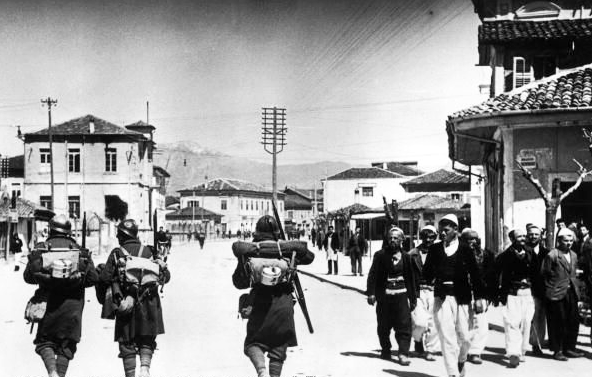
Italian soldiers in Durres, 7 April 1939 of the year
To be continued ...
- Alexander Samsonov
- https://ru.wikipedia.org/
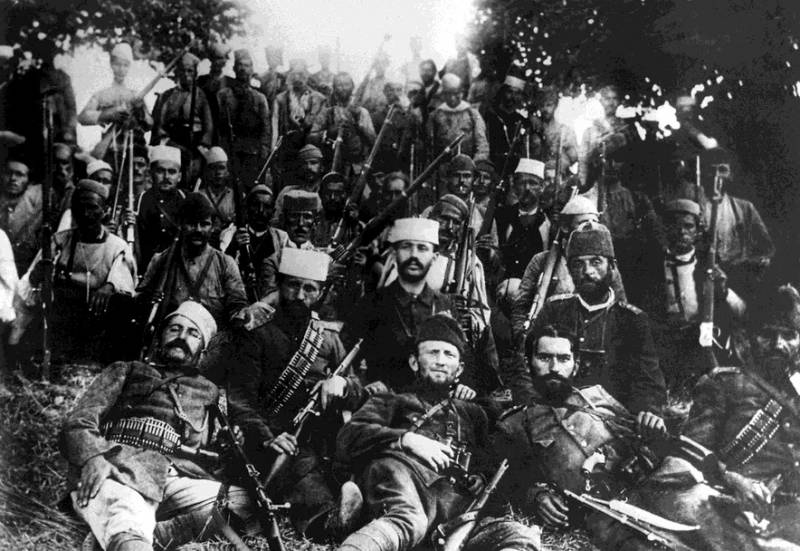
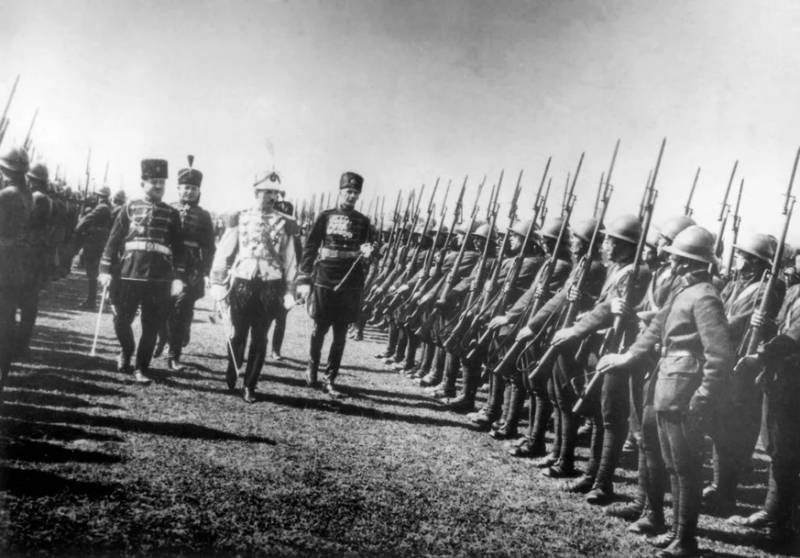
Information